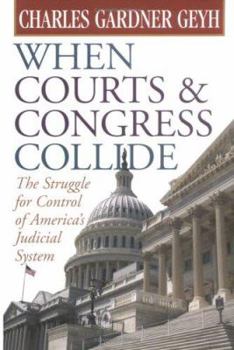When Courts and Congress Collide: The Struggle for Control of America's Judicial System
Select Format
Select Condition 
Book Overview
"This is quite simply the best study of judicial independence that I have ever read; it is erudite, historically aware, and politically astute."---Malcolm M. Feeley, Claire Sanders Clements Dean's... This description may be from another edition of this product.
Format:Hardcover
Language:English
ISBN:0472099221
ISBN13:9780472099221
Release Date:January 2006
Publisher:University of Michigan Press
Length:332 Pages
Weight:1.94 lbs.
Dimensions:1.3" x 6.4" x 9.4"
Customer Reviews
2 ratings
Analyzing the influence of the judicial decision-making and control through congressionally appointe
Published by Thriftbooks.com User , 18 years ago
When Courts And Congress Collide: The Struggle For Control Of America's Judicial System by Charles Gardner Geyh (Professor of Law and Charles L. Whistler Faculty Fellow at Indiana University at Bloomington) is an in-depth, comprehensive, and scholarly study of the history of various checks and balances involved in the procedures of the American court system. Analyzing the influence of the judicial decision-making and control through congressionally appointed judges, When Courts And Congress Collide produces a definitive study of the intricate political power struggle arising from the ideological processes of judicial powers and competing influences throughout the entirety of America political, cultural, and economic life. When Courts And Congress Collide is very strongly recommended to students of American history and political science, as well of the study of the American judicial system in history, in the present, and the foreseeable future.
Congress and Judicial Independence
Published by Thriftbooks.com User , 18 years ago
Given all the recent conservative uproar about Terry Schiavo, and the resulting DeLay/Frist threats to "discipline" the federal courts, not to mention the continuing fallout over Bush v. Gore, this book could not have come along a more opportune time. And a fine book it is irrespective of the timing. The author, currrently a law professor but formerly a judicial clerk, litigator, Judiciary Committee staffer, and judicial branch "lobbyist," is admirably equipped to address this important topic. This is simply the best book on this topic I have seen and an invaluable reference source on this topic. Basically, the author contends that the various methods we usually associate with legislative control of the judiciary--including impeachment, control of jurisdiction, budget, etc. -- have, with one exception, not proven effective. That one exception is, as recent Supreme Court and Circuit Court nominee hi-jinx illustrate, the power of the Senate to confirm judicial nominees. The central reason for this sitution, the author demonstrates, is a long-run recognition by Congress of the importance of judicial independence resulting in a marked reluctance to interfere with sitting judges and their decisions. In order to explore this relationship, the book first looks at the origin of judicial independence before and at the constitutional convention, the Judicary Acts of 1789 and 1801, five key periods of stress between the courts and the presidency and congress, and the development of a self-regulating and discipling judiciary (e.g., the Judicial Conference, the Rules Enabling Act, and the Administrative Office of the U.S. Courts). Separate chapters address impeachment (perhaps a bit too much in detail) and appointments, appointment being the sole way to exercise control unrestricted by concerns for judicial independence. A very strong chapter discusses the ways in which courts can avoid or mitigate conflict, including the Aswander rules and Bickel's "passive virtues" among other topics. The author suggests this "dynamic equilibrium" may be shifting due to congressional interference through such devices as sentencing guidelines. For its part, the Rehnquist Court cut back the margins on long established congressional power in several areas. Moreover, the judiciary has developed an interesting technique of lobbying congress for or against changes, and striking down as unconstitutional those legislative changes with which it disagrees. Hopefully, the author is overly pessimistic--it would be a shame to have radicals of whatever persuasion controlling the federal courts to suit their own agendas. An outstanding discussion, superbly researched, and skillfully written (though a bit overly detailed in sections).





